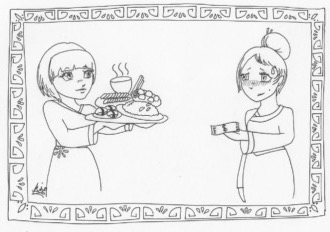
Drawn by granddaughter!
Similar to Emily Post for our western traditions and manners, those of us with Japanese Heritage also maintain various levels of GIRI.
Yesterday, I was asked to pick up a distant cousin, at the airport from Pocatello, Idaho, where she is attending Idaho State. Her parents flew in from Hilo, Hawaii, a few hours later. Her family is precise about paying me back and thanking me in ways far beyond the favors I do for them. I was excited to participate because I felt I owed them the favor for what they have done in the past for me.
We had a small argument as to who pays for dinner. She won because I’m too agreeable. As I dropped her off at her hotel, she had another gift she had purchased, a box of Macarons. I reluctantly accepted, despite the fact that I didn’t get to be the hostess for dinner. Now, I feel obligated for next time and we will continue the game.
Issei (immigrants born in Japan) families, I have known, kept written notebooks and logs of how much money they received as memorial and celebratory gifts from relatives and friends, especially for funerals. Therefore, when the times came to reciprocate, the exact amount was given back. The notebook pages were kept by the oldest son to continue the tradition.
Like favors with our American hostess gifts, there is an OKAESHI (giving back requirement). I don’t know when it stopped, but when we used to bring KODEN (donations to help offset funeral expenses), we got an envelope back with a few postal stamps. My uncle gave everyone who came to the grand opening of his grocery store a Japanese ceramic dish.
Many Nisei (children of Issei) continued most of these traditions. My mother often refused invitations to socialize with her childhood Japanese friends and wouldn’t participate in the Japanese community events telling us kids, “No, we can’t go visit them because we can’t afford it.” My nuclear family was very poor because my father was not a good farmer, but uncles and aunts helped us a lot because we are “family”. As a Sansei (child of the Nisei), I love socializing and the obligations. I “play by feel”, not duty.
OMOIDE Writing Program celebrated the 30th year of sharing stories at the Japanese Cultural and Community Center of Washington in Seattle in November 2021. Several of us noticed the abundance of the contribution to the pot-luck refreshment table. We all feel “embarrassed” to not bring at least twice as much as we expect to consume. Several, stay and make sure the room is as orderly or better than when we entered as we leave.
My friend John Asari told me his story of when he was little and how their family went to parks for outings and picnics. As responsible and good citizens, his mother made sure the family left the place cleaner than when they found it.
Because of 200 years of isolation and because Japanese citizens live so close to each other in their limited livable island territory, Japanese brought socializing and good manners to a science. For me it’s common sense and psychologically fulfilling to be courteous and do what feels right.